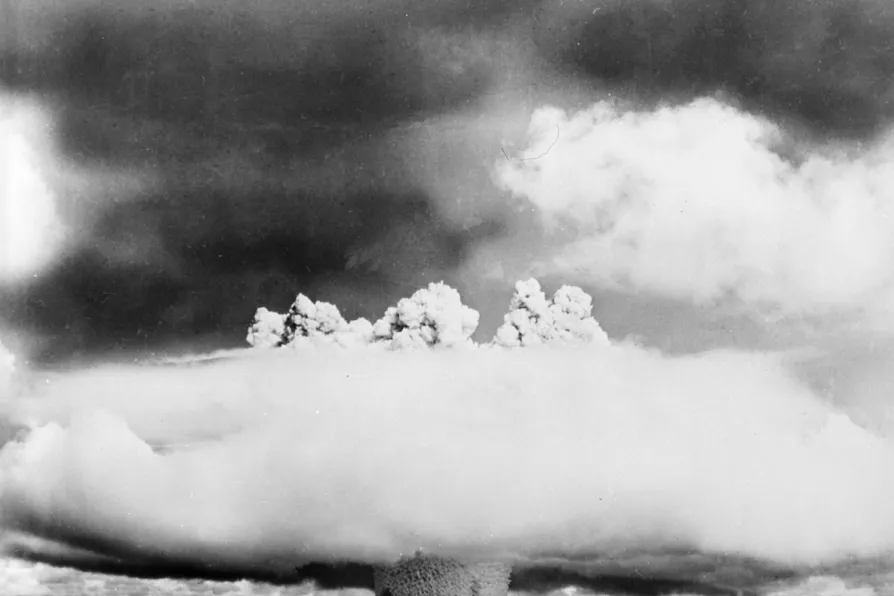
 Phase 3 of the Atom Bomb explosion in the Lapoon of Bikini Island
Phase 3 of the Atom Bomb explosion in the Lapoon of Bikini Island
SIR KEIR STARMER’S “triple lock” commitment to Britain’s nuclear programme (for which read our junior role in the US nuclear programme) shows quite how far the Labour Party has fallen since he took over the leadership in 2020.
“The changed Labour Party I lead,” as it now seems to be known, apparently has a “total commitment” to nuclear weapons. What a contrast from a Labour leader committed to peace and international security, who went on record saying: “I am opposed to the use of nuclear weapons. I am opposed to the holding of nuclear weapons. I want to see a nuclear-free world. I believe it is possible.”
The reality is that the “changed Labour Party” is committed not to peace or security, but to a new arms race that threatens the future of humanity.
The case for nuclear weapons is both morally and logically bankrupt.
First, it is important to remember what we are talking about here. Indiscriminate weapons of mass destruction whose use would constitute a war crime and a crime against humanity. The nuclear bombs dropped on Hiroshima and Nagasaki in 1945 literally melted human beings — with no discrimination between combatants and civilians — and left generations contaminated by the after-effects of radiation, causing leukaemia, other cancers, miscarriages and death.
An estimated 140,000 people were killed by the Hiroshima bomb and a further 74,000 in Nagasaki. Ninety per cent of physicians and nurses were killed or injured. As icanw.org notes, all of the dedicated burns beds in the entire world would have been insufficient to care for the survivors of one nuclear bomb.
The warheads used in the Trident nuclear weapons system are many times more powerful than the bombs dropped on Hiroshima and Nagasaki. The implications of them being used are unthinkable.
Then, there is the whole strategic thinking behind possessing nuclear weapons. Throughout the cold war, deterrence was supposedly based on the theory of “mutually assured destruction.” Essentially, any conflagration which turned nuclear would involve the complete or near-complete destruction of the countries involved (and potentially of the majority ofhumans on the planet) and therefore peace would reign supreme.
Anyone can probably spot the logical fallacy in this strategy — possession (at huge cost) of a weapon you can never use, simply to ensure that someone else can possess a weapon of similar power, never to be used.
But of course, the reality is that nuclear weapons do not in fact prevent war. A simple glance at the state of the world today will tell you that.
Starmer claims that we need nuclear weapons “in the face of rising global threats and growing Russian aggression.” Well, Britain is already deeply embroiled in a conflict involving Russia. Nuclear weapons have done nothing to avoid that conflict and indeed, the expansion of nuclear-armed Nato to the borders of Russia is a huge contributing factor.
If Starmer truly believed in advancing international security, he would be calling for a ceasefire in Ukraine now, alongside a ceasefire in Gaza, where Israel (a nuclear-armed state) is committing genocide against the Palestinian people.
However, the biggest lie in today’s announcement is the idea that investment in weapons of mass destruction will “build a secure future” for families in Barrow or elsewhere.
Supporters of Trident claim that 30,000 jobs are protected by investment in Britain’s nuclear weapons (the real figure according to analysis by CND is closer to 11,500).
30,000 jobs at a cost of £205bn!
The same amount, invested in the productive economy, would create in excess of two million jobs (based on comparison with investment in the economy following the economic crisis of 2008/9). Instead, the bulk of the £205bn spent on Trident will go into the pockets of shareholders in the global arms trade, much of it ending up in the military-industrial complex.
The weaknesses in Britain’s economy are due to the lack of investment in our productive economy and the consequent destruction of the country’s manufacturing base. Witness the current job losses in the British steel industry.
If Labour really cares about the creation of secure well-paid jobs, it would take the money to be wasted on Trident and invest in rebuilding Britain’s manufacturing base, creating high-skilled, well-paid jobs for communities which has suffered the ravages of 40 years of deindustrialisation.
As former Labour leader Jeremy Corbyn said today, “Security is being able to put food on the table. It’s having a roof over your head.”
This is the vision the trade union movement must fight for, not money for the arms manufacturers at the expense of our people.














